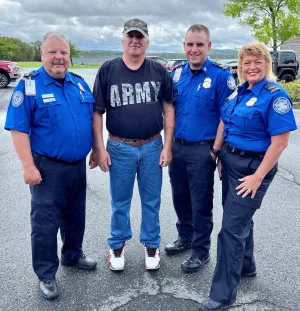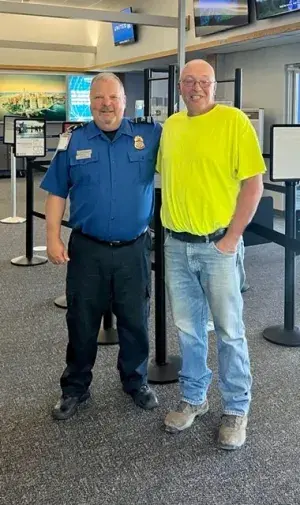 Maine’s Presque Isle International Airport Supervisory TSA Officer Dan Marquis, emergency victim Joe Levesque, Lead TSA Officers Tyler Raymond and Michelle Morrison take time to reflect on Levesque’s recovery. (Photo courtesy of TSA PQI)
Maine’s Presque Isle International Airport Supervisory TSA Officer Dan Marquis, emergency victim Joe Levesque, Lead TSA Officers Tyler Raymond and Michelle Morrison take time to reflect on Levesque’s recovery. (Photo courtesy of TSA PQI)
Upstate Maine’s Presque Isle International Airport (PQI) services two United Airlines flights during the week, 12 1/2 hours apart. It’s a small airport with five full-time and four part-time TSA officers, so it’s safe to say everyone at the airport knows one another very well.
It’s not unusual for the airport lobby to be slow at certain parts of the day, so when Chris Perkins, a Star City Sanitation employee, ran inside looking for help, he knew where to find people.
With about 45 minutes until shift change and no one in the checkpoint screening queue, Supervisory TSA Officer (STSO) Dan Marquis, the p.m. supervisor, was discussing the day’s morning flight with a.m. Lead TSA Officers (LTSO) Tyler Raymond and Michelle Morrison.
“We heard someone pulling on the training room office door,” said Marquis. “LTSO Raymond opened the door, and I heard a male voice say, ‘Can someone call 911? There’s someone on the ground in the parking lot.’”
The officers ran outside to catch up to Perkins with Morrison already dialing 911.
“I was mentally preparing to help and going over CPR protocol in my head,” Morrison said as she provided the emergency dispatch operator with the location and nature of the emergency.
They found a second sanitation worker unresponsive on his back just outside the driver side door of his vehicle.
“As I got closer, I noticed that he had soiled his pants, which indicates either a sign of a stroke or a heart attack,” said Marquis. “When looking down at him, his face was discolored and his mouth was open. His pupils were also constricted.”
“Just before STSO Marquis started to administer CPR, I checked all of the patient’s vitals, looking/ listening for a breath and feeling for a pulse,” recalled Raymond.
“There was none,” said Marquis.
“After performing CPR for a few minutes, the man was trying to gasp for air,” Marquis noted.
Raymond tried again to get a pulse, this time from the victim’s neck, but was unsuccessful.
Morrison remained on the phone, calmly relaying critical information to the operator and her coworkers and ran back inside the terminal for the automated external defibrillator (AED) when prompted by the dispatcher.
“The AED analyzed the heart rhythm and advised us to shock. Raymond took over compressions and after the second shock, I could hear sirens from a distance,” said Marquis.
Police and EMS responded, allowing the TSA officers to step back and debrief the first responders.
Marquis, a retired Maine State trooper, relied on his law enforcement skills, and he and Morrison gathered information which helped police fill in gaps in the incident timeline.
“Chris told me he worked with the victim, Joe Levesque, all morning and he hadn’t noticed any changes in him,” said Marquis. “He said that they backed up to the dumpster, and they both got out to open it up so they could dump (the garbage) in the truck. Once he got to the back, he didn’t see the driver. He was wondering where he was, so he walked back around the front of the truck and found him on the ground unresponsive.”
“When I heard Joe Levesque was making a full recovery, I felt immediate joy,” said Raymond whose father was a full-time firefighter. “I am now a firefighter in my free time and have been with the department for close to 10 years. When it came time for me to step in during this situation, it was like a second language, and I knew exactly what to do.”
“I feel honored I was part of a team who came to the aid of an individual who, if we had not been there, may not have had another day to celebrate life,” said Morrison. “The ability to work as a team, with not only our knowledge of what to do in an emergency but with the nonverbal and verbal communication, was great.”
“All three TSA officers are CPR-certified, and they responded in a manner that embodied the humanity in us all,” said PQI TSA Manager Andrew Trudo. “They saw the terror in Chris’ eyes and reacted without hesitation. I’m proud of our amazing officers.”
By Karen Robicheaux, TSA Strategic Communications & Public Affairs

